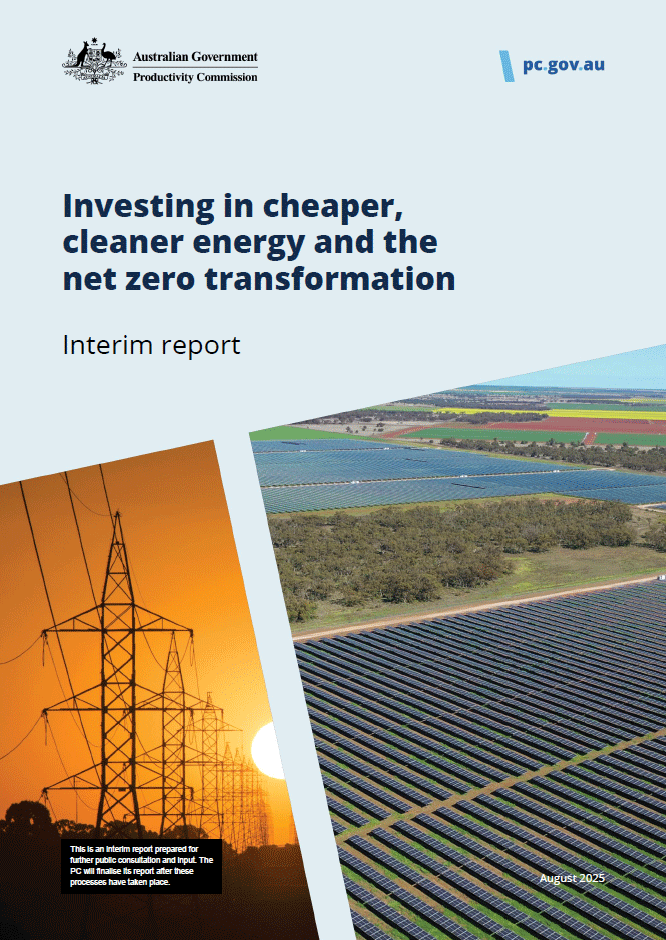Investing in cheaper, cleaner energy and the net zero transformation

Interim report
Released 03 / 08 / 2025
The PC has been asked by the Australian Government to conduct an inquiry into Investing in cheaper, cleaner energy and the net zero transformation. As part of this work, we have been tasked with identifying priority reforms and developing actionable recommendations.
In this interim report, the PC presents draft recommendations focused on three key policy reform areas:
- Reducing the cost of meeting emissions targets
- Speeding up approvals for new energy infrastructure
- Addressing barriers to private investment in adaptation.
We invite feedback and further information from individuals, businesses and organisations. Your insights will help us strengthen our recommendations and identify practical pathways for implementation.
Webinar
Podcast
A transcript will be available shortly.
Consistent incentives and faster approvals key to the net zero transformation
Australia should address the gaps and overlaps in emissions reduction incentives, speed up approvals for clean energy infrastructure, and create a resilience-rating system for all housing to meet our clean energy targets and adapt to climate change, the interim report of a Productivity Commission inquiry recommends.
The report, Investing in cheaper, cleaner energy and the net zero transformation, is the second of five that the PC will publish over the next two weeks setting out practical reforms to boost Australia’s productivity.
‘Australia’s net zero transformation is well under way. Getting the rest of the way at the lowest possible cost is central to our productivity challenge,’ said Commissioner Barry Sterland.
‘With the right policy settings, we can limit the costs of decarbonising and speed up our approvals to unlock the opportunities of lower cost, more abundant clean energy. We can also boost our resilience to the effects of climate change and minimise their human and economic costs.’
Reducing the cost of meeting emissions targets
Building on existing policies, the interim report says Australia should improve incentives in electricity, heavy industry and transport – which together account for 79% of Australia’s gross emissions – to support an efficient net zero transformation.
The report calls for market-based incentives in the electricity sector to replace the Renewable Energy Target and the Capacity Investment Scheme, neither of which will support new investment in renewables after 2030.
The report also recommends broadening and improving the Safeguard Mechanism and introducing a technology-neutral policy to incentivise heavy vehicle operators to reduce emissions.
‘Enduring, broad-based market mechanisms are the best way to reduce carbon emissions. More consistent and comprehensive incentives are key to reaching net zero at lowest cost,’ said Commissioner Sterland.
Faster clean energy approvals
The interim report also includes recommendations to speed up approvals for clean energy projects.
‘We need to build a large amount of clean energy infrastructure to meet climate targets and ensure reliable and affordable energy supply. But our sluggish and uncertain approval processes are not up to the task,’ said Commissioner Martin Stokie.
The report calls for reforms to the Environment Protection and Biodiversity Conservation Act, which is slowing down vital approvals without effectively protecting the environment. These reforms would introduce national environmental standards, improve regional planning, and set clear rules about engaging with local communities and Aboriginal and Torres Strait Islander people.
‘Overdue reforms to the EPBC Act would both speed up approvals and better protect the environment,’ said Commissioner Stokie.
The interim report also calls for a greater focus on approvals for priority projects. It recommends the Government appoint an independent Clean Energy Coordinator-General to work across government and break through roadblocks. A specialist ‘strike team’ should also be established to ensure priority projects are efficiently assessed.
‘Getting to yes or no quicker on priority projects would meaningfully speed up the clean energy transition,’ said Commissioner Stokie.
A national focus on adaptation policy
Adapting to climate change is critical for productivity growth and should be a long-term policy priority.
Climate-related risks are significant and growing; boosting resilience to these perils can reduce their human impacts, while limiting labour productivity losses from heatwaves and the financial costs of disaster recovery.
The interim report calls on the Australian Government to lead work to develop a public database of all climate hazards, and an agreed series of goals and targeted policies for governments to improve the resilience of Australia’s housing.
A new housing resilience rating system should be complemented by supporting material so that households, builders and insurers can easily identify upgrades that would improve a property’s resilience.
‘People’s experience of climate change will depend on the resilience of their home, but most lack the information they need to invest in upgrades,’ said Commissioner Sterland.
‘As climate risks intensify, boosting our resilience can lower the costs of disaster recovery and create a healthier, safer and more productive Australia.’
The PC is accepting submissions to inform the final report later in the year.
Media requests
The following excel file contains tables of data used to make the figures within this report.
Chart data (Excel - 56.6 KB)Preliminaries: Cover, Copyright and publication detail, Opportunity for comment, Terms of reference, Acknowledgements and Contents
Executive summary
Draft recommendations
About this inquiry
Our areas of focus
Our approach
- Reducing the cost of meeting emissions targets
Introduction
Incentivise reducing electricity emissions after 2030
Improve incentives in heavy industry
Fill gaps and eliminate overlaps in transport
Apply frameworks to achieve targets at least cost - Speeding up approvals for new energy infrastructure
Why it is important to speed up approvals
Reform national environment laws
Focus on priority projects
Consider the energy transition in approval decisions
The economic benefits of faster approvals - Addressing barriers to private investment in adaptation
Australians need resilient housing
Accountability measures keep policy action on track
A. Public consultation
Abbreviations
References
Printed copies of this report can be purchased from Canprint Communications.
You were invited to make written submissions by 15 September 2025.


